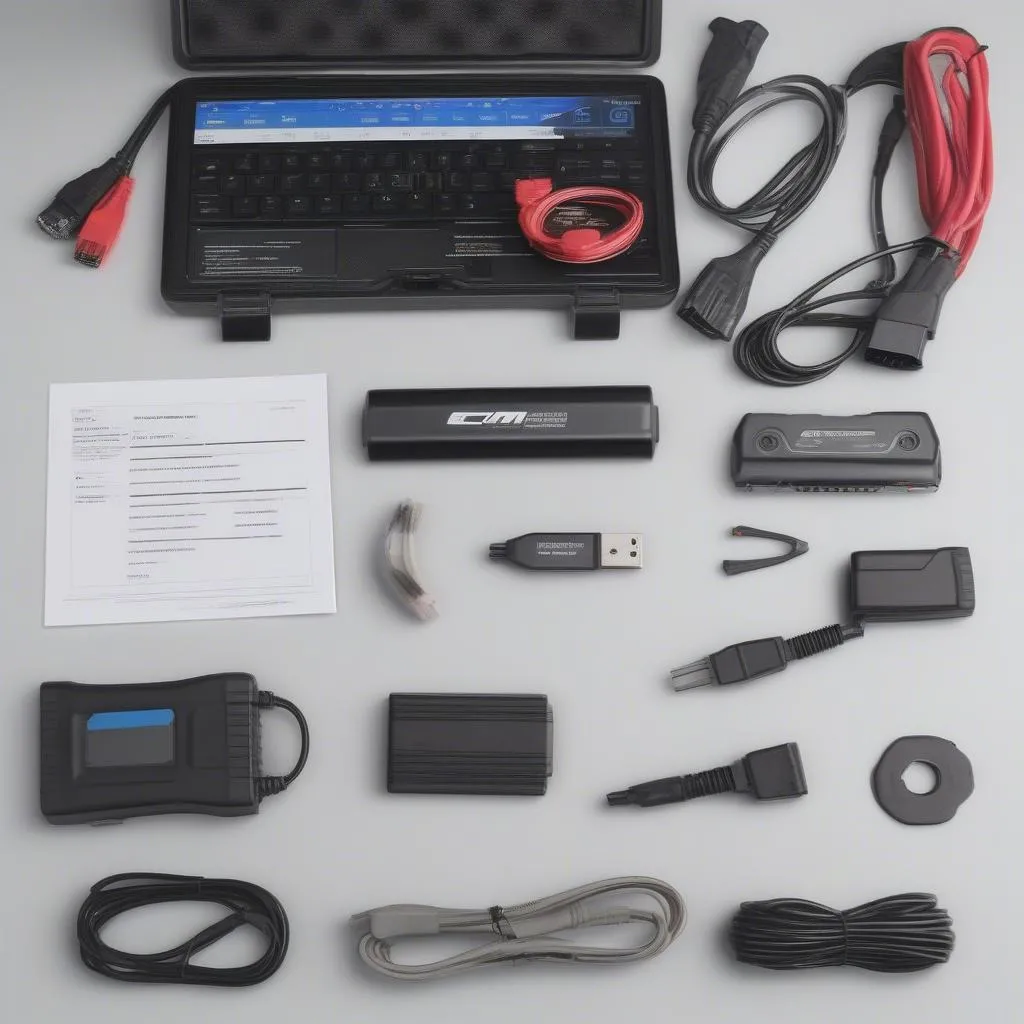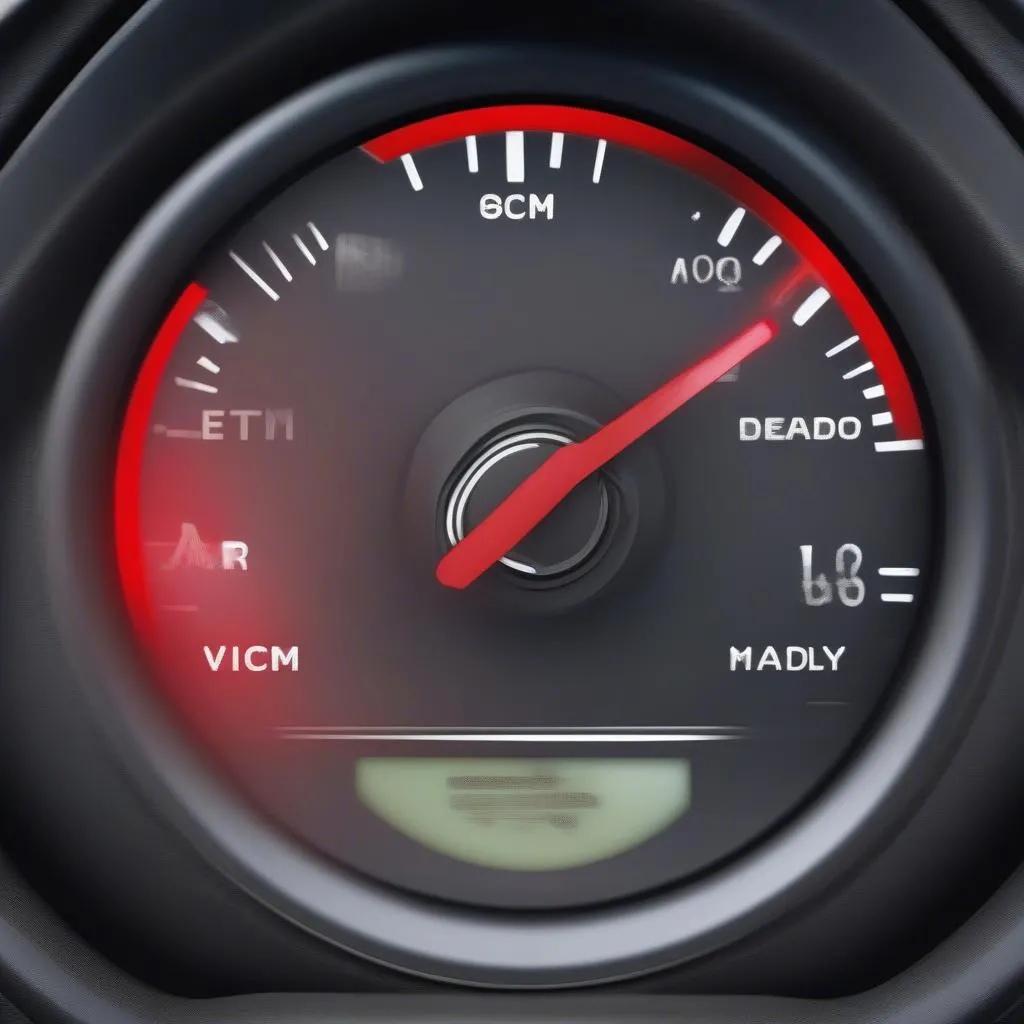Ever found yourself stranded on the side of the road, staring at your car’s dashboard with a flashing engine light? It’s a frustrating experience, but it’s often a sign that your ECM (Engine Control Module) is not happy. This powerful component, often considered the brain of your car, controls everything from fuel injection to ignition timing.
But how do you diagnose these issues? Enter the Ecm Scanner, a vital tool for any serious DIY mechanic or professional technician.
What is an ECM Scanner?
Imagine your car’s ECM as a complex computer with its own operating system, sending and receiving signals to manage your engine’s performance. An ECM scanner, sometimes referred to as an OBD2 scanner, is a device that allows you to tap into this system and communicate with the ECM.
From a mechanic’s perspective, an ECM scanner is a gateway to understanding your car’s health. It’s like having a doctor’s stethoscope, but for your engine. By connecting the scanner to your car’s diagnostic port, you can access a treasure trove of information, including:
- Error codes: These are messages from the ECM indicating a potential problem. Imagine them as your car’s “check engine” warning light, but with a lot more detail.
- Live data: This allows you to see real-time information about your engine’s performance, such as engine speed, fuel pressure, and oxygen sensor readings.
- Freeze frame data: This captures the conditions that were present when an error code was logged. Think of it as a snapshot of your car’s state at the time of the issue.
From a technical perspective, the ECM scanner uses a standardized communication protocol called OBD2 (On-Board Diagnostics 2). This protocol, introduced in 1996 for vehicles sold in the US, ensures compatibility across different car models and makes it possible to use a single scanner for a wide range of vehicles.
Why is an ECM Scanner so Important?
Imagine you’re driving down the highway, and suddenly your car starts sputtering. You pull over, check the engine, but find nothing obvious. This is where an ECM scanner comes in handy.
Here’s how it helps:
- Troubleshooting: It helps pinpoint the root cause of engine problems by providing detailed information about the malfunction.
- Diagnostic Codes: It translates cryptic error codes into understandable language, making it easier for you to know what’s wrong.
- Cost Savings: It can save you money by helping you diagnose and fix problems before they escalate, potentially avoiding expensive repairs.
- Performance Monitoring: It can be used to monitor your engine’s performance over time, allowing you to catch potential issues early.
What Types of ECM Scanners are Available?
There’s a wide range of ECM scanners available, each with its own features and capabilities. Here’s a breakdown of some common types:
Basic Scanners: These are affordable options, often found at auto parts stores. They can read and clear trouble codes and sometimes display live data.
Advanced Scanners: These offer more features, such as graphing live data, accessing manufacturer-specific information, and even the ability to reprogram ECMs.
Professional Scanners: These are used by mechanics and dealerships, offering comprehensive diagnostic capabilities, including bi-directional control, which allows you to send commands to the ECM.
Examples:
- Autel: Autel is a leading manufacturer of professional diagnostic tools, renowned for their advanced scanners like the MaxiCOM MK808.
- Launch: Launch offers a range of scanners for various needs, from basic to professional, including the X431 Pro3.
- OBDLink: OBDLink is known for its affordable and user-friendly Bluetooth OBD2 scanners, ideal for DIY mechanics.
Choosing the Right ECM Scanner
The best ECM scanner for you will depend on your needs, budget, and level of expertise.
For DIY mechanics, a basic scanner might be enough, especially for routine diagnostics. However, if you’re working on more complex problems or want access to advanced features, a more advanced scanner might be worth the investment.
Professional mechanics will likely choose a professional-grade scanner that offers all the necessary features for comprehensive diagnostics and repairs.
Here are some factors to consider when choosing an ECM scanner:
- Compatibility: Make sure the scanner is compatible with your vehicle’s make and model.
- Features: Determine what features you need, such as code reading, live data, graphing, or bi-directional control.
- Price: Set a budget and compare prices from different manufacturers.
- Reviews: Read reviews from other users to get insights into the scanner’s performance and reliability.
ECM Scanner FAQs
Here are some common questions people ask about ECM scanners:
How do I use an ECM Scanner?
1. Connect the Scanner: Plug the scanner into your car’s diagnostic port, typically located under the dashboard.
2. Turn on the Scanner: Power up the scanner and follow the instructions on the screen.
3. Select your Vehicle: Choose your vehicle’s make and model.
4. Read and Clear Codes: Select the option to read codes and view any error messages.
5. View Live Data: Choose the option to view live data, such as engine speed and fuel pressure.
Can I use an ECM scanner to reprogram my ECM?
While some advanced scanners can perform basic reprogramming, it’s best left to professionals or dealerships. Reprogramming ECMs requires specialized knowledge and tools, and can be complex.
Are there any risks associated with using an ECM scanner?
There are minimal risks associated with using an ECM scanner. However, it’s crucial to use the correct scanner and follow the manufacturer’s instructions.
Where can I buy an ECM scanner?
ECM scanners can be purchased at auto parts stores, online retailers, or from specialized automotive tool suppliers.
Want to Learn More?
If you’re interested in learning more about ECM scanners or specific models, visit our website for detailed reviews and comparisons:
- Link to Best OBD2 iPhone Scanner
- Link to Chevy Scanner
- Link to Used OBD2 Scanner for Sale
- Link to Best OBD2 Scanner with ABS and SRS
Do you have a question about ECM scanners? Leave a comment below or contact our team of automotive experts via Whatsapp at +84767531508.
 ECM Scanner Tool
ECM Scanner Tool
 Car Dashboard Error Light
Car Dashboard Error Light
 Mechanic Using Scanner
Mechanic Using Scanner
In conclusion, an ECM scanner is an invaluable tool for anyone who wants to understand their car’s engine health. Whether you’re a DIY mechanic or a professional, having the right scanner can help you troubleshoot issues, save money, and keep your car running smoothly.